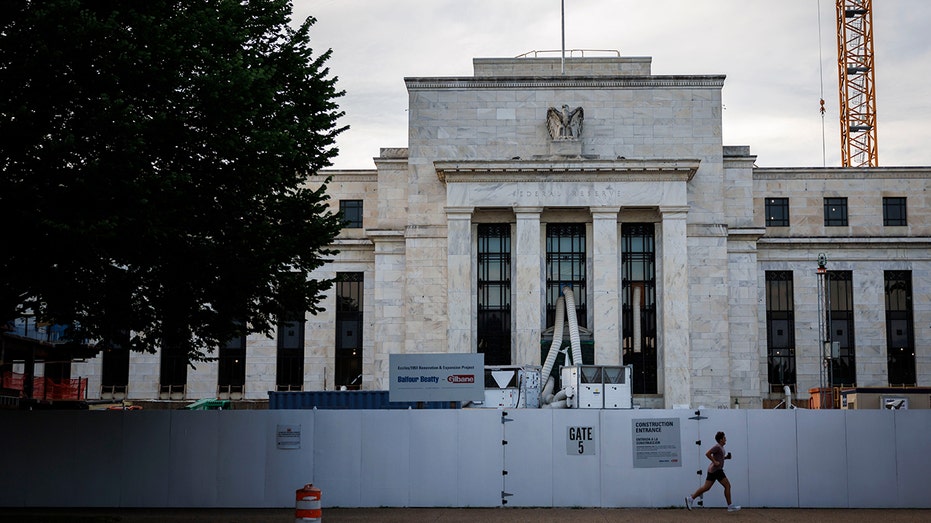UBS Private Wealth Management managing director Alli McCartney explains how the Fed’s messaging could affect the market on ‘Making Money.’
The Federal Reserve laid the groundwork for a September interest rate cut at the conclusion of its two-day meeting Wednesday, but the much-anticipated reduction may offer little relief to Americans squeezed by higher borrowing costs.
Fed Chair Jerome Powell told reporters at a press conference after the central bank voted to hold rates steady at a two-decade high that a September rate cut could be “on the table” if inflation continues to cool.
“We’re getting closer to the point at which it’ll be appropriate to reduce our policy rate,” Powell said, “but we’re not quite at that point.”
Even then, rates are unlikely to come down enough to provide any real reprieve to would-be homebuyers who have seen a key tenet of the American dream slip away due to astronomically high mortgage rates.
THE US HOUSING MARKET IS ‘STUCK,’ AND MIGHT REMAIN THAT WAY UNTIL 2026
Federal Reserve Chair Jerome Powell speaks at a news conference following a Federal Open Market Committee meeting on July 31, 2024, in Washington, D.C. (Photo by Andrew Harnik/Getty Images / Getty Images)
The “announcement doesn’t change the outlook for the year when it comes to mortgage rates,” said Afifa Saburi, capital markets analyst at Veterans United Home Loans. Saburi noted that if the Fed delivers fewer cuts than investors currently expect, there could even be a “slight pull back” in mortgage rates.
“If that happens, the range we have seen this year for rates will remain intact,” she said. “Potential savings are low for a prospective homebuyer hoping for rate improvement this year.”
HOME PRICES JUST SET ANOTHER RECORD HIGH AS AFFORDABILITY CRISIS WORSENS
Mortgage rates spiked in 2022 and 2023 as the Fed waged an aggressive campaign to crush high inflation. In the span of just 16 months, the central bank approved 11 rate increases – the fastest pace of tightening since the 1980s.

Even just a minor change in mortgage rates can affect how much potential homebuyers pay each month. (David Paul Morris/Bloomberg via / Getty Images)
While the federal funds rate is not what consumers pay directly, it affects borrowing costs for home equity lines of credit, auto loans and credit cards. Mortgage rates are also influenced by moves in the 10-year Treasury yield.
Rates on the popular 30-year fixed mortgage are currently hovering around 6.73%, according to Freddie Mac. While that marks a decrease from a peak of 7.79% recorded last fall, it remains notably higher than the pandemic-era lows of just 3%.
MORTGAGE CALCULATOR: SEE HOW MUCH HIGHER RATES COULD COST YOU
Higher mortgage rates over the past three years have created a “golden handcuff” effect in the housing market. Sellers who locked in a record-low mortgage rate of 3% or less during the pandemic began have been reluctant to sell, limiting supply further and leaving few options for eager would-be buyers.
Yet rates are likely to end the year around 6.4%, and remain above 6% throughout most of 2025, even as the Fed prepares to cut interest rates for the first time in four years, according to Lisa Sturtevant, Bright MLS chief economist.

The Marriner S. Eccles Federal Reserve building in Washington, D.C., on June 25, 2024. (Photographer: Ting Shen/Bloomberg via Getty Images / Getty Images)
“There is no direct ‘cause-and-effect’ relationship between the Fed rate cuts and a drop in mortgage rates,” Sturtevant said. “As a result, we should not expect a significant decline in mortgage rates following the Fed’s September meeting. In fact, expectations about a September rate cut are already baked in which is why we’re already starting to see mortgage rates start to come down.”
GET FOX BUSINESS ON THE GO BY CLICKING HERE
Even just a minor change in mortgage rates can affect how much potential homebuyers pay each month.
A recent study from LendingTree compared the average monthly payments on 30-year fixed-rate mortgages in April 2022, when the rate hovered around 3.79%, and one year later, when rates jumped to 5.25%.
It found that higher rates cost borrowers hundreds more each month and potentially added as much as $75,000 over the lifetime of the 30-year loan.


